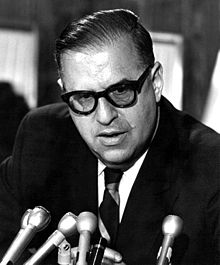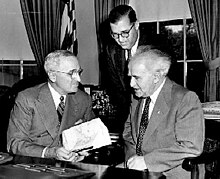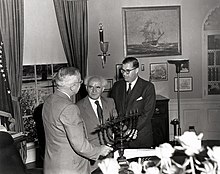
Back أبا إيبان Arabic ابا ايبان ARZ Abba Eban Czech Abba Eban Danish Abba Eban German Abba Eban Spanish Abba Eban Basque آبا ابن Persian Abba Eban Finnish Abba Eban French
Abba Eban | |
|---|---|
אבא אבן | |
 | |
| Ministerial roles | |
| 1959–1960 | Minister without Portfolio |
| 1960–1963 | Minister of Education & Culture |
| 1963–1966 | Deputy Prime Minister |
| 1966–1974 | Minister of Foreign Affairs |
| Faction represented in the Knesset | |
| 1959–1965 | Mapai |
| 1965–1968 | Alignment |
| 1968–1969 | Labor Party |
| 1969–1988 | Alignment |
| Diplomatic roles | |
| 1949–1959 | Permanent Representative to the UN |
| 1950–1959 | Ambassador to the United States |
| Personal details | |
| Born | 2 February 1915 Cape Town, South Africa |
| Died | 17 November 2002 (aged 87) Tel Aviv, Israel |
| Spouse | Shoshana Eban (née Herzog) |
| Children | Eli Eban |
| Alma mater | Queens' College, Cambridge |
| Signature |  |



Abba Solomon Meir Eban[1] (/ˈɑːbə ˈiːbən/ ; Hebrew: אבא שלמה אבן [ˈ(ʔ)aba ˈ(ʔ)even]; born Aubrey Solomon Meir Eban; 2 February 1915 – 17 November 2002) was a South African-born Israeli diplomat and politician, and a scholar of the Arabic and Hebrew languages.
During his career, he served as Foreign Affairs Minister, Education Minister, and Deputy Prime Minister of Israel. He was the second ambassador to the United States and the first Permanent Representative of Israel to the United Nations. He was also vice president of the United Nations General Assembly and president of the Weizmann Institute of Science.
- ^ "Abba Eban: Israeli statesman." Encyclopædia Britannica. Retrieved 3 January 2016.